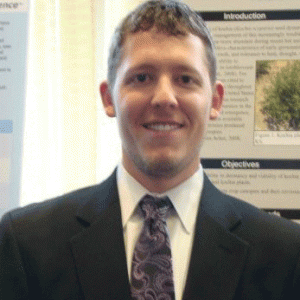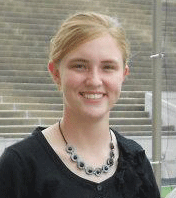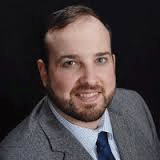The Department of Agronomy has made three key new hires since September 2014: Andrew Esser, Agronomist-in-Charge, North Central Experiment Field; Kim Kerschen, Academic Coordinator; and Colby Moorberg, Soils Teaching and Research. Each of them is working hard for you!
Andrew Esser
Andrew Esser has been hired as the new Agronomist-in-Charge at the North Central Experiment Field in Belleville and Irrigation Experiment Field in Scandia. He began his duties at the fields on Dec. 1, 2014. Esser is from Lenexa, Kansas. He received his B.S. in Agronomy (Business and Industry option) from K-State in 2011. While working on his B.S. degree, Esser worked in the Biotechnology Laboratory in the Department of Horticulture with Dr. Sunghun Park, performing DNA and plasmid extraction, among other things, in a research project involving genetically engineering carrots. He then received his M.S. in Agronomy (Weed Ecology) from K-State in 2014, under Anita Dille. His thesis involved environmental factors influencing kochia seed characteristics. His field research was conducted at Hays.
Since graduating with his M.S. degree, Esser has been working as a Commercial Agronomy Intern with J.R. Simplot Plant Sciences in Boise, Idaho. He has also worked as an agronomy intern at Nemaha County Coop in Seneca, Kansas.

Kim Kerschen
Kim Kerschen has been hired as Instructor and Academic Coordinator. This is the position formerly held by Dana Minihan.

She started in this position in June 2014. As the Academic Coordinator, Kerschen manages the Agronomy Teaching Office and teaches the Agronomy Orientation and Internship in Agronomy courses. She also coordinates the Agronomy Ambassador program and serve as an adviser of the Wheat State Agronomy Club.
She serves as a student advisor and helps with the departmental faculty advising program. She also assist with recruitment, retention, and placement of undergraduate students.
“I really enjoy working with the students, faculty, and staff in the department and helping them in any way I can! Students are always welcome to stop by and visit or ask questions. In my spare time I enjoy attending K-State volleyball, football, and men’s and women’s basketball games. On free weekends, I like to go home and spend time with my family and work in the garden,” she says.
Kerschen grew up on a grain and dairy farm outside Garden Plain, Kansas. She graduated from K-State with a B.S. in Agronomy in 2012 and stayed at K-State to work on her Masters in Agronomy with Dr. Mickey Ransom. Her thesis was titled “Student Understanding of Soil Classification using the Simplified Guide to Soil Taxonomy.” Her research dealt with teaching soil classification with the new Simplified Guide to Soil Taxonomy (now called the Illustrated Guide to Soil Taxonomy) in AGRON 305: Soils and AGRON 515: Soil Genesis and Classification. She obtained her M.S. degree in May 2014.
She was a Graduate Teaching Assistant (GTA) for AGRON 305: Soils for 5 semesters and also helped coach the soil judging team.
“It was through my GTA experience that I realized I enjoyed teaching and working with students. I decided to apply for the Instructor/Academic Coordinator position because I enjoy teaching and working with students, but also because it combines two of my passions: K-State and Agronomy,” Kerschen says.
Colby Moorberg
Dr. Colby Moorberg has joined the faculty in a soils teaching/research position. This is the position formerly held by Dr. Steve Thien. Moorberg’s first day in the department will be January 5, 2015.

Moorberg will be responsible for teaching AGRON 305: Soils each semester, beginning with the spring 2015 semester. He will also be teaching AGRON 635: Soil Conservation and Management in fall 2015. His research program will be in the area of plant roots and rhizosphere characterization.
Moorberg grew up on a small hog farm in Iowa. Wetlands was his first great academic interest when he enrolled at Iowa State University, but soils quickly became another of his passions with the help of “some incredibly enthusiastic soil science professors at ISU.” He graduated with a B.S. from ISU in environmental science in 2008, then earned an M.S. degree in soil science from North Carolina State University in 2010. He obtained his Ph.D. from NCSU in 2013 in soil science, with a minor in water resources. His sub-disciplines are hydropedology and soil physics.
His graduate research focused on phosphorus cycling, transport, and dissolution in wetland soils restored from agricultural land. He also taught a variety of undergraduate soil science laboratory courses. After graduate school, Moorberg was a postdoctoral researcher at the University of Washington in the Department of Civil and Environmental Engineering. The focus of his postdoctoral research was methane oxidation in boreal bog and fen wetlands in Alaska.
Overall, his research interests include root and rhizosphere dynamics, hydropedology, wetland delineation, soil greenhouse gas fluxes, wetland restoration and mitigation, soil and water conservation, water resources, and transport of nutrients and chemicals in saturated and unsaturated soils. His specialties include root imaging and analysis, soil and plant analysis, wetland delineation, hydropedology, soil physics, ICP-MS, spectrophotometry, gas chromatography, Statistical Analysis Software (SAS), SigmaPlot, ArcGIS, DRAINMOD, Soil and Water Assessment Tool (SWAT), Microsoft Office, RootFly, ImageJ, and more.
Moorberg says his professional goals are “to educate and inspire the next generation of soil scientists and agronomists, and to gain a better understanding of root-soil interactions through experimentation and observation.”